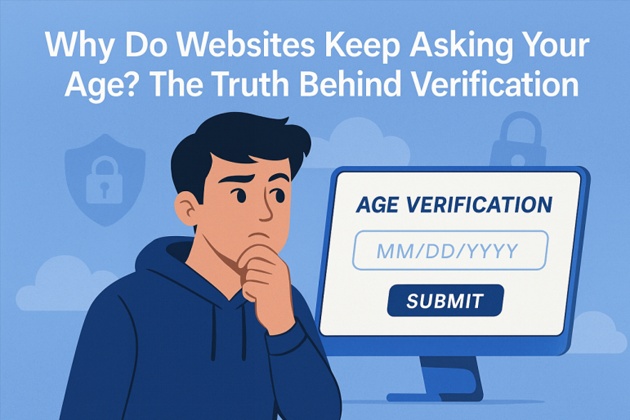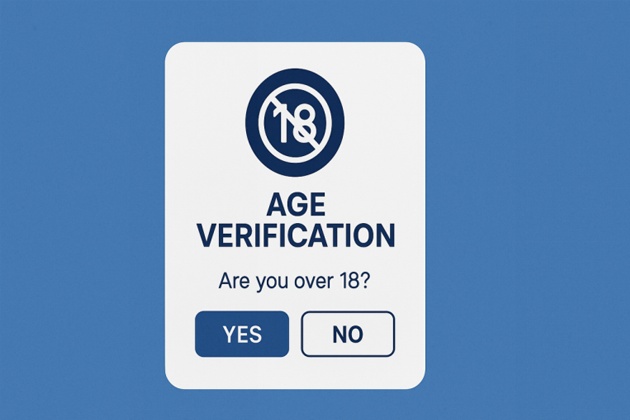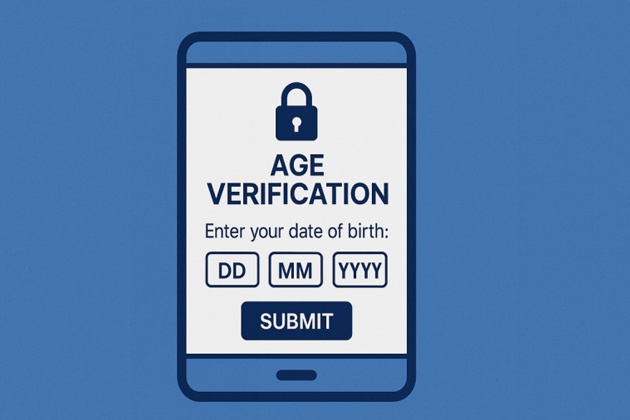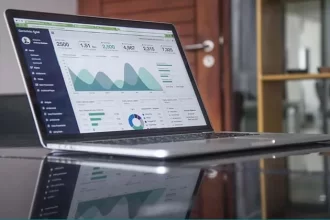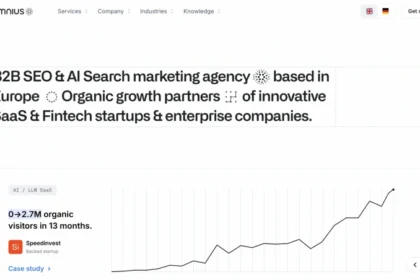Ever tried signing up for a website or game and been blocked just because of your age?
From video platforms to online stores, more and more websites are requiring users to prove their age. It’s not just about checking a box anymore — some sites now ask for ID, facial recognition, or other sensitive information. But why?
In this article, we’ll explore what age verification is, why it matters for both safety and legal compliance, how it ties into cybersecurity, and what young users need to know about protecting their data and online rights.
What Is Age Verification and Why It Exists
You’ve Seen It Everywhere — But Do You Know What It Actually Does?
You’re on a website. Maybe it’s a game, a streaming service, or even a social app. And before you can explore anything, there it is — the age gate.
“Enter your date of birth.”
“Are you 18 or older?”
Sometimes, that’s all it takes. Other times, you might be asked to upload an ID, scan your face, or even go through weird verification steps.
It feels random. It feels annoying. But there’s a reason behind it.
Let’s be real: websites don’t care how old you are just for fun. They’re doing it because they have to — legally.
The Real Reason Sites Ask for Your Age
It all comes down to protecting minors and following laws that regulate online content. If a website offers content that isn’t suitable for kids — like gambling, alcohol, explicit content, or even just unfiltered chatrooms — then it’s required to block access from underage users.
There are actual laws that control this, like:
- COPPA (Children’s Online Privacy Protection Act) in the U.S.
- GDPR in the EU, which includes age-specific data protection rules
- KYC (Know Your Customer) laws, especially in fintech or gaming
If companies don’t follow these rules? They can get fined. Heavily.
So when you’re blocked from a site because you’re “too young,” it’s not about targeting you — it’s about protecting themselves, and yes, also protecting you.
If you’re curious about how age verification laws have evolved across different regions and industries, there’s a great breakdown on SafePaper that puts it all into context.
“But I Just Want to Watch a Video…”
Totally fair. Nobody likes being locked out.
But here’s the thing: platforms like YouTube, TikTok, Discord, and others have been under pressure for letting minors access content they shouldn’t. They’re now rolling out more aggressive age checks to avoid lawsuits and public backlash.
So what feels like a wall is actually a shield — even if it doesn’t always feel that way.
How Age Verification Connects to Cybersecurity
Age Checks Are About More Than Just Your Birthday
When a site asks for your age — especially if it wants ID or personal info — it’s not just verifying how old you are. It’s also testing your identity and making sure that people aren’t lying or pretending to be someone else.
And that’s where cybersecurity steps in.
You might think cybersecurity is just about blocking hackers or avoiding viruses. But it’s also about protecting your personal identity, privacy, and online behavior — including your age.
Preventing Identity Fraud and Account Abuse
Imagine this:
A 30-year-old signs up for a teen-only community by faking their age.
Or a kid tries to open an account on a gambling site using someone else’s ID.
Both cases are risky. For users. For platforms. For everyone.
That’s why age verification systems are often tied into larger security protocols. Some sites now use AI to detect face age, others use databases to cross-check IDs. And yes — it can feel invasive.
But the goal isn’t to stalk you. It’s to make sure everyone is who they say they are.
Are These Systems Always Safe?
Honestly? Not always.
Just because a site asks for your ID doesn’t mean they handle your data well. That’s why it’s crucial to:
- Only share documents with verified, trusted platforms
- Check if the site mentions encryption or privacy compliance
- Avoid giving personal info to platforms that feel sketchy
This is where you need to become your own privacy protector.
Can You Bypass Age Checks? (And Why You Shouldn’t)
Yeah, People Try It All the Time
You’ve probably heard someone say,
“Just fake your birthday — it’s no big deal,”
or
“Use a VPN and you can get around it.”
And sometimes, those tricks work. Kind of. Temporarily.
But here’s the truth you don’t always hear: you’re not outsmarting the system — you’re taking a risk.
What Really Happens When You Fake Your Age
Sure, entering a different birth year might get you in. But some platforms are getting smarter.
They track patterns. They analyze behavior. They check logins across devices. If something doesn’t add up? Your account can be flagged, suspended — or banned entirely.
Even worse, if you upload fake documents or use someone else’s ID, that could lead to account fraud or terms-of-service violations. In some regions, that’s not just a “rule break.” It’s actually illegal.
So no — bypassing age checks isn’t as clever as it sounds. Especially if you care about keeping your accounts, your privacy, and your online rep.
Using a VPN to Bypass Age Limits? Think Twice
You might be thinking,
“But if I use a VPN, won’t that trick the system?”
A VPN hides your IP address and location, but it doesn’t change your identity. And age verification isn’t just about geography — it’s about who you are.
Some platforms detect VPN use and block access entirely. Others might treat VPN users with extra scrutiny. So instead of flying under the radar, you might be putting a spotlight on yourself.
And if the VPN you’re using isn’t secure? You could be handing your data to a third-party server without even realizing it.
What Happens to Your Data?
You Gave Them Your Age — Now What?
You typed in your birthdate. Maybe even scanned your ID. But have you ever stopped to ask:
Where does that data go? Who sees it? How long is it stored?
These are the questions a lot of users — especially younger ones — forget to ask. And that’s a problem.
Because not all websites handle your information the same way.
The Good, the Bad, and the Shady
Let’s break it down.
Good platforms encrypt your data, store it securely, and delete it after verifying your age. They follow strict privacy laws like GDPR and let you know exactly how your info will be used.
Bad platforms might store your info indefinitely — sometimes without even telling you. They might sell it, reuse it, or keep it in insecure systems.
Shady platforms? They don’t care about your rights. If you’re unlucky, they’ll leak your data, sell it to advertisers, or worse — leave it exposed to hackers.
So… Should You Ever Upload an ID?
Only if you trust the platform. That means:
- It has clear privacy policies
- It uses secure encryption (look for HTTPS and data handling statements)
- It gives you the option to delete your data or control how it’s used
And if a random site demands your passport for “age verification”?
Walk away. Seriously.
You wouldn’t hand your real ID to a stranger on the street — don’t do it online either.
What You Can Do to Stay Safe Online
You Have More Control Than You Think
Just because websites ask for your information doesn’t mean you have to give it away blindly. You’re not helpless in the face of age gates, pop-ups, or sketchy platforms.
In fact, your choices matter a lot.
You’re the one clicking “Yes” or “No.” You’re the one entering that birthdate, uploading that ID, or choosing to back out. And every one of those moments is a chance to protect yourself.
Look Before You Share
If a website asks for your age — especially anything more than just your birth year — stop and think for a second.
- Do you recognize the site?
- Does it seem professional and secure?
- Is there a privacy policy linked nearby?
If the site feels weird, buggy, or makes strange demands (like uploading a passport just to view memes), that’s your cue to bounce.
Your age is your business. Don’t hand it over to platforms that won’t respect it.
Talk to Someone You Trust
No, this doesn’t make you a kid. It makes you smart.
If something feels off — like a platform asking for too much, or an age gate that seems unusually aggressive — talk to a friend, a parent, or someone you trust online.
They might help you spot red flags you didn’t even realize were there.
And if you’re underage, there’s zero shame in asking for help. That’s not being “less grown-up” — that’s being aware.
Use the Tools You Already Have
- Your browser has privacy settings. Use them.
- Your device lets you block trackers and disable third-party cookies. Do it.
- Your instincts? Trust them.
You don’t need to be a cybersecurity expert to take care of your online self.
You just need to stay alert, ask questions, and remember that you don’t owe any website your identity.
If you want a deeper look at how different countries are enforcing age verification laws and what you can do to stay protected, this detailed age verification guide is a solid place to start.
Final Thoughts
You’re not imagining it — the internet really is asking more and more questions about who you are and how old you are.
And yeah, it can feel intrusive, repetitive, even unfair.
But here’s the truth: age verification isn’t just about blocking you. It’s about protecting your privacy, shielding minors from unsafe spaces, and keeping digital platforms accountable.
That said, you still have every right to:
- Question what you’re being asked
- Refuse to give up personal data when it feels unnecessary
- Learn how your digital footprint is being tracked
Understanding age verification — and how it connects to cybersecurity — gives you power.
Power to protect your identity. Power to avoid shady traps. And power to make better choices in a digital world that doesn’t always play fair.
So next time a website asks for your age, don’t just click and roll your eyes.
Take a second. Think. And own your side of the screen.



